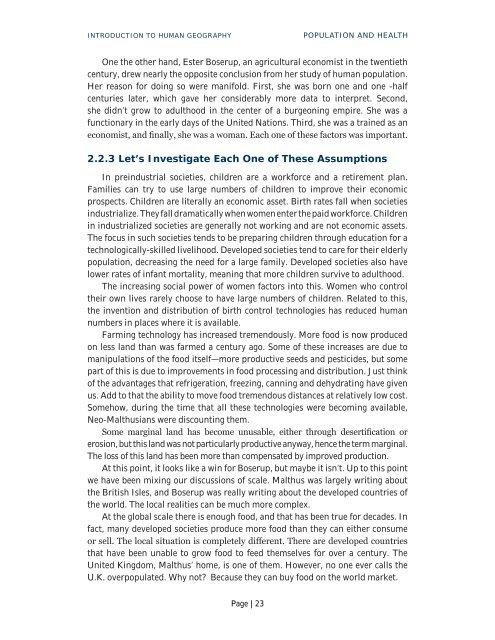Introduction to Human Geography (2nd Edition), 2019a
Introduction to Human Geography (2nd Edition), 2019a
Introduction to Human Geography (2nd Edition), 2019a
Create successful ePaper yourself
Turn your PDF publications into a flip-book with our unique Google optimized e-Paper software.
INTRODUCTION TO HUMAN GEOGRAPHY<br />
POPULATION AND HEALTH<br />
One the other hand, Ester Boserup, an agricultural economist in the twentieth<br />
century, drew nearly the opposite conclusion from her study of human population.<br />
Her reason for doing so were manifold. First, she was born one and one -half<br />
centuries later, which gave her considerably more data <strong>to</strong> interpret. Second,<br />
she didn’t grow <strong>to</strong> adulthood in the center of a burgeoning empire. She was a<br />
functionary in the early days of the United Nations. Third, she was a trained as an<br />
<br />
2.2.3 Let’s Investigate Each One of These Assumptions<br />
In preindustrial societies, children are a workforce and a retirement plan.<br />
Families can try <strong>to</strong> use large numbers of children <strong>to</strong> improve their economic<br />
prospects. Children are literally an economic asset. Birth rates fall when societies<br />
industrialize. They fall dramatically when women enter the paid workforce. Children<br />
in industrialized societies are generally not working and are not economic assets.<br />
The focus in such societies tends <strong>to</strong> be preparing children through education for a<br />
technologically-skilled livelihood. Developed societies tend <strong>to</strong> care for their elderly<br />
population, decreasing the need for a large family. Developed societies also have<br />
lower rates of infant mortality, meaning that more children survive <strong>to</strong> adulthood.<br />
The increasing social power of women fac<strong>to</strong>rs in<strong>to</strong> this. Women who control<br />
their own lives rarely choose <strong>to</strong> have large numbers of children. Related <strong>to</strong> this,<br />
the invention and distribution of birth control technologies has reduced human<br />
numbers in places where it is available.<br />
Farming technology has increased tremendously. More food is now produced<br />
on less land than was farmed a century ago. Some of these increases are due <strong>to</strong><br />
manipulations of the food itself—more productive seeds and pesticides, but some<br />
part of this is due <strong>to</strong> improvements in food processing and distribution. Just think<br />
of the advantages that refrigeration, freezing, canning and dehydrating have given<br />
us. Add <strong>to</strong> that the ability <strong>to</strong> move food tremendous distances at relatively low cost.<br />
Somehow, during the time that all these technologies were becoming available,<br />
Neo-Malthusians were discounting them.<br />
<br />
erosion, but this land was not particularly productive anyway, hence the term marginal.<br />
The loss of this land has been more than compensated by improved production.<br />
At this point, it looks like a win for Boserup, but maybe it isn’t. Up <strong>to</strong> this point<br />
we have been mixing our discussions of scale. Malthus was largely writing about<br />
the British Isles, and Boserup was really writing about the developed countries of<br />
the world. The local realities can be much more complex.<br />
At the global scale there is enough food, and that has been true for decades. In<br />
fact, many developed societies produce more food than they can either consume<br />
<br />
that have been unable <strong>to</strong> grow food <strong>to</strong> feed themselves for over a century. The<br />
United Kingdom, Malthus’ home, is one of them. However, no one ever calls the<br />
U.K. overpopulated. Why not? Because they can buy food on the world market.<br />
Page | 23


















